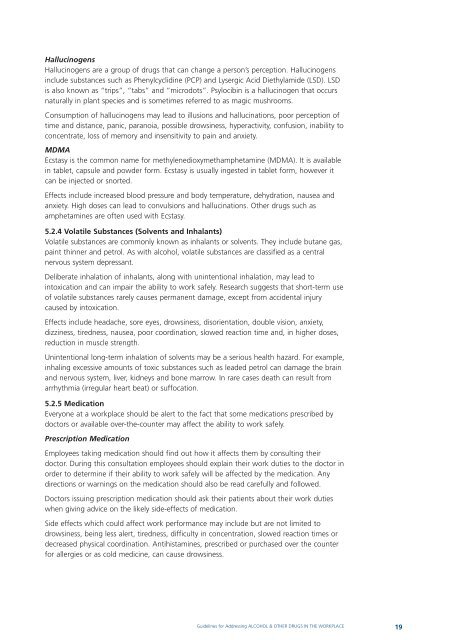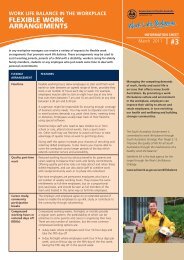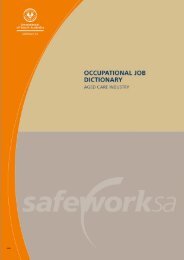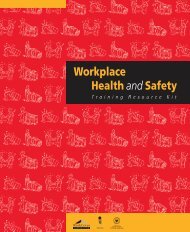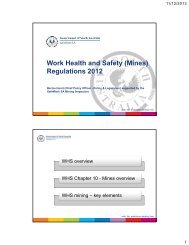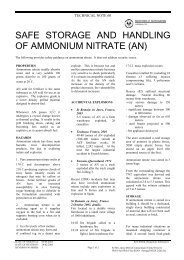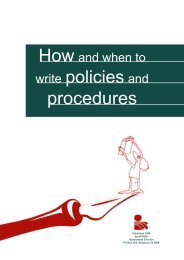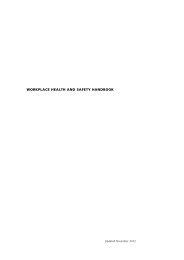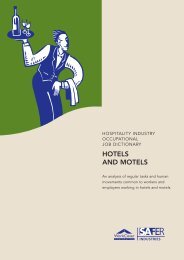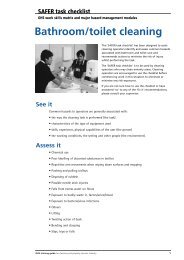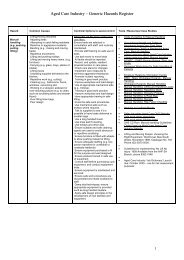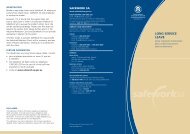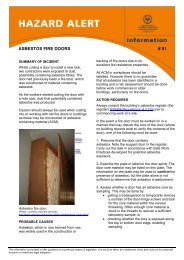Alcohol Drugs Workplace Alcohol Drugs Workplace - SafeWork SA ...
Alcohol Drugs Workplace Alcohol Drugs Workplace - SafeWork SA ...
Alcohol Drugs Workplace Alcohol Drugs Workplace - SafeWork SA ...
Create successful ePaper yourself
Turn your PDF publications into a flip-book with our unique Google optimized e-Paper software.
Hallucinogens<br />
Hallucinogens are a group of drugs that can change a person’s perception. Hallucinogens<br />
include substances such as Phenylcyclidine (PCP) and Lysergic Acid Diethylamide (LSD). LSD<br />
is also known as “trips”, “tabs” and “microdots”. Psylocibin is a hallucinogen that occurs<br />
naturally in plant species and is sometimes referred to as magic mushrooms.<br />
Consumption of hallucinogens may lead to illusions and hallucinations, poor perception of<br />
time and distance, panic, paranoia, possible drowsiness, hyperactivity, confusion, inability to<br />
concentrate, loss of memory and insensitivity to pain and anxiety.<br />
MDMA<br />
Ecstasy is the common name for methylenedioxymethamphetamine (MDMA). It is available<br />
in tablet, capsule and powder form. Ecstasy is usually ingested in tablet form, however it<br />
can be injected or snorted.<br />
Effects include increased blood pressure and body temperature, dehydration, nausea and<br />
anxiety. High doses can lead to convulsions and hallucinations. Other drugs such as<br />
amphetamines are often used with Ecstasy.<br />
5.2.4 Volatile Substances (Solvents and Inhalants)<br />
Volatile substances are commonly known as inhalants or solvents. They include butane gas,<br />
paint thinner and petrol. As with alcohol, volatile substances are classified as a central<br />
nervous system depressant.<br />
Deliberate inhalation of inhalants, along with unintentional inhalation, may lead to<br />
intoxication and can impair the ability to work safely. Research suggests that short-term use<br />
of volatile substances rarely causes permanent damage, except from accidental injury<br />
caused by intoxication.<br />
Effects include headache, sore eyes, drowsiness, disorientation, double vision, anxiety,<br />
dizziness, tiredness, nausea, poor coordination, slowed reaction time and, in higher doses,<br />
reduction in muscle strength.<br />
Unintentional long-term inhalation of solvents may be a serious health hazard. For example,<br />
inhaling excessive amounts of toxic substances such as leaded petrol can damage the brain<br />
and nervous system, liver, kidneys and bone marrow. In rare cases death can result from<br />
arrhythmia (irregular heart beat) or suffocation.<br />
5.2.5 Medication<br />
Everyone at a workplace should be alert to the fact that some medications prescribed by<br />
doctors or available over-the-counter may affect the ability to work safely.<br />
Prescription Medication<br />
Employees taking medication should find out how it affects them by consulting their<br />
doctor. During this consultation employees should explain their work duties to the doctor in<br />
order to determine if their ability to work safely will be affected by the medication. Any<br />
directions or warnings on the medication should also be read carefully and followed.<br />
Doctors issuing prescription medication should ask their patients about their work duties<br />
when giving advice on the likely side-effects of medication.<br />
Side effects which could affect work performance may include but are not limited to<br />
drowsiness, being less alert, tiredness, difficulty in concentration, slowed reaction times or<br />
decreased physical coordination. Antihistamines, prescribed or purchased over the counter<br />
for allergies or as cold medicine, can cause drowsiness.<br />
Guidelines for Addressing ALCOHOL & OTHER DRUGS IN THE WORKPLACE 19


